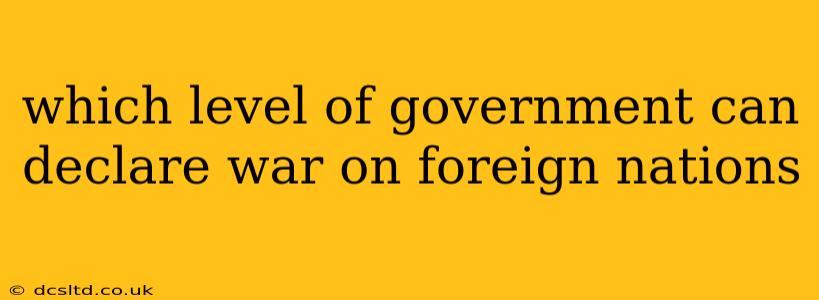Which Level of Government Can Declare War on Foreign Nations?
In the United States, the power to declare war rests solely with the federal government, specifically Congress. This is explicitly stated in Article I, Section 8, Clause 11 of the U.S. Constitution, which grants Congress the power "To declare War, grant Letters of Marque and Reprisal, and make Rules concerning Captures on Land and Water."
This constitutional provision is a cornerstone of American democracy, establishing a crucial check on the executive branch's power. The President, as Commander-in-Chief of the armed forces, can deploy troops and engage in military actions, but only Congress possesses the authority to formally declare war. This separation of powers prevents any single branch of government from unilaterally initiating large-scale conflicts.
However, the reality of modern warfare has introduced complexities to this seemingly clear-cut division of power. While Congress retains the constitutional authority to declare war, the President's role as Commander-in-Chief often leads to military engagements without a formal declaration of war. This has happened numerous times throughout American history, prompting ongoing debates about the balance of power between the legislative and executive branches concerning military action.
Let's delve into some frequently asked questions to clarify this further:
Can the President Declare War Without Congressional Approval?
No, the President cannot legally declare war without Congressional approval. While the President can deploy troops and engage in military actions, these actions are considered to be within the President's role as Commander-in-Chief, but they are not a formal declaration of war. The President's power in this area is subject to debate and legal interpretation, and often depends on the specific circumstances and the nature of the military action. Congress can, and sometimes does, limit the President's ability to engage in military action through legislation, such as by refusing to fund certain operations.
What is the Difference Between a Declaration of War and Other Military Actions?
A formal declaration of war, as outlined in the Constitution, is a comprehensive commitment by the nation to engage in a prolonged and significant conflict. It signifies a total mobilization of national resources and a widespread societal shift towards a war footing. Other military actions, such as military interventions, limited strikes, or peacekeeping operations, while involving the use of force, do not carry the same weight or legal ramifications as a formal declaration of war. These actions typically lack the broad scope and commitment of a declared war.
What Role Does the Supreme Court Play in Declarations of War?
The Supreme Court's role in declarations of war is indirect. The Court's judicial review power allows it to interpret laws relating to war powers, including the War Powers Resolution. However, the Supreme Court generally avoids direct involvement in the political process of declaring war. The court's focus is on interpreting the law, not on determining foreign policy or military strategy.
What About State Governments?
State governments have absolutely no power to declare war on foreign nations. The power to declare war is exclusively a federal power, vested in the Congress by the Constitution. Any attempt by a state government to declare war would be unconstitutional and unenforceable. State militias are under the command of the federal government when called into federal service.
In conclusion, while the practical application of war powers in the modern era is complex and often debated, the constitutional authority to formally declare war remains firmly with the U.S. Congress. This separation of powers is crucial for maintaining a balance between effective national defense and the protection of democratic principles.
